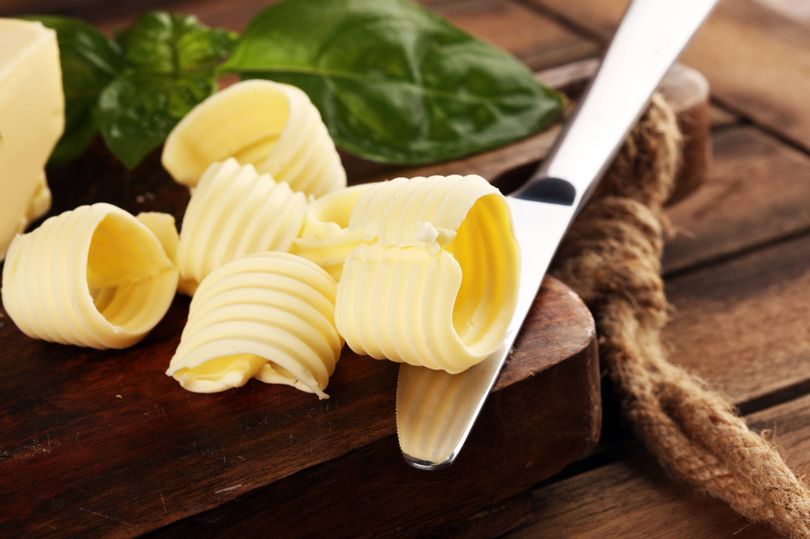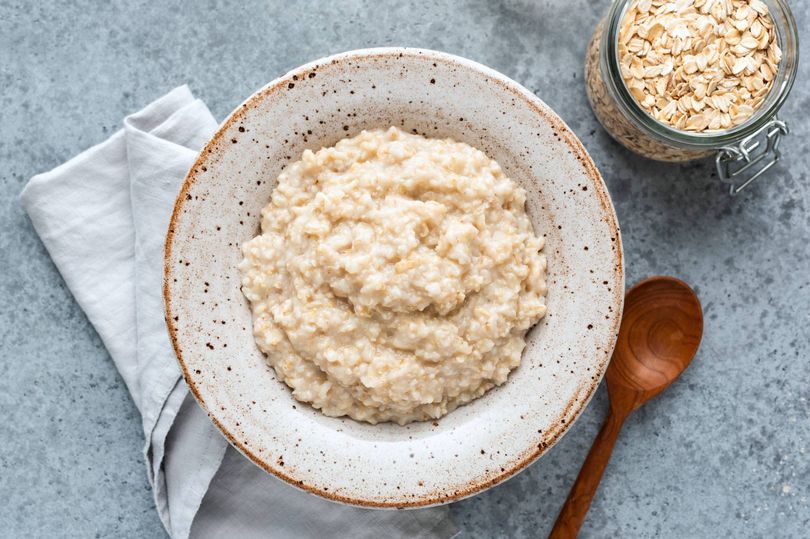Having high cholesterol is often referred to as a ‘silent killer’ due to the lack of obvious symptoms. Typically, a blood test is required for diagnosis, and if left unmanaged, it can increase the risk of heart attacks and strokes.
However, a healthy diet and lifestyle changes can make a significant difference.
Fortunately, certain foods have been found to have a similar effect to statins in lowering cholesterol levels. According to cardiologists at the British Heart Foundation (BHF), two natural alternatives have been shown to positively impact cholesterol levels.
- Dad wins court battle with TV Licensing after cancelling to watch Netflix
- Emergency alert to sound on every phone in UK – what you need to know
Cholesterol is a crucial aspect of heart health, and high levels can increase the risk of heart disease and circulatory problems. But what exactly is cholesterol, and why is it a concern?
There are two main types of cholesterol: LDL (low-density lipoprotein), often referred to as “bad” cholesterol, and HDL (high-density lipoprotein), known as “good” cholesterol. While both types play important roles in the body, high levels of LDL can contribute to heart disease, whereas HDL helps remove excess cholesterol from the body, reports
Surrey Live
.

Elevated levels of LDL, often dubbed as ‘bad’ cholesterol, can result in the formation of fatty deposits, known as plaques, within artery walls. Over time, these plaques can harden and narrow the arteries, obstructing blood flow.
Our latest newsletter covers the health dangers of nightmares and how the ‘Mummy’s Curse’ is curing cancer – and much more.
This diminished blood circulation to crucial organs, particularly the heart and brain, heightens the likelihood of experiencing a heart attack, stroke, or peripheral artery disease. If a piece of plaque breaks off, it can travel through the bloodstream, potentially resulting in a blood clot that blocks an artery, which may cause a heart attack or stroke.
High cholesterol levels can lead to other health issues. These may include hypertension and diabetes, which in turn increase the risk of cardiovascular diseases.
Certain foods contain natural compounds that can decrease cholesterol levels in a way similar to statin drugs. These beneficial foods are rich in soluble fibre, plant sterols and stanols, and omega-3 fatty acids.
Statins work by blocking an enzyme (HMG-CoA reductase) in the liver, which is crucial for cholesterol production. This helps in reducing the amount of ‘bad’ cholesterol (LDL) in the blood and potentially stabilises plaque in arteries.
Some foods, including oats and plant sterols, also assist the liver in drawing more cholesterol from the blood to produce bile.
Your GP will assist in determining the most suitable statin for you, taking into account your medical history and cholesterol level. The various types of statins that your GP might recommend include:

It’s important to remember that while certain foods can help lower cholesterol, no single food or dietary change can rival the effectiveness of statin medications in reducing cholesterol. However, some foods can aid in lowering cholesterol levels through lifestyle changes and may be part of a broader heart health strategy.
Statins are powerful drugs that effectively reduce cholesterol levels and should be taken as prescribed by a doctor. Alongside medication, maintaining a healthy diet, regular exercise, and keeping a healthy weight are crucial in managing cholesterol.
It’s essential to consult your GP before making significant dietary alterations or considering alternative treatments.
1. Oats.
Oats are loaded with a soluble fibre known as beta-glucan, which plays a key role in their ability to lower cholesterol levels. When ingested, beta-glucan transforms into a gel-like substance in the digestive system, effectively trapping bile acids rich in cholesterol and preventing them from entering the bloodstream.
As a result, the liver must extract more cholesterol from the blood to produce bile, thereby reducing LDL cholesterol levels. Statins can also perform this function.
By inhibiting cholesterol production in the liver, statins prompt the liver to utilise more of the cholesterol already present in the blood for bile production, which aids in lowering LDL cholesterol levels in the blood.
Research indicates that incorporating beta-glucans into a balanced diet may lead to a slight decrease in cholesterol levels. A comprehensive review of 58 controlled trials, published in the British Journal of Nutrition, discovered that middle-aged individuals who consumed 3.5g of beta-glucan from oat products daily over a span of three to twelve weeks experienced a 4.2% reduction in ‘bad’ cholesterol, compared to those who did not include it in their diet.
The Food and Drug Administration (FDA) recommends a daily intake of 3g of oat beta-glucan to assist in lowering LDL cholesterol levels. According to the BFH, “a 40g serving of porridge oats contains 2g of beta-glucan, while a 250ml glass of oat milk contains 1g of beta-glucans. However, there is no research linking oats to a lower risk of heart attack or stroke.”
Oats are a fantastic source of fibre, which not only lowers cholesterol levels but also promotes heart health and overall well-being. All varieties of oats, including rolled oats, steel-cut oats, and oat bran, are rich in beta-glucan, making them an excellent choice for cholesterol reduction.

Incorporating oats into your diet is a piece of cake. You can kick off your day with a warm bowl of porridge, add them to your favourite baked treats, or use them to enhance the nutritional value of soups and casseroles.
2. Plant sterols and stanols.
Certain margarines, milks, and yoghurts make cholesterol-lowering claims, due to being fortified with plant sterols and stanols, also known as phytosterols, which have been shown to help lower cholesterol levels. A comprehensive review of 124 studies, published in the British Journal of Nutrition in 2014, suggested that consuming up to 3.3 grams of phytosterols each day can lead to a gradual reduction in ‘bad’ low-density lipoprotein (LDL) cholesterol by 6% to 12% over roughly four weeks.
Plant sterols and stanols are structurally similar to cholesterol, which allows them to compete for absorption in the intestines, thereby helping to reduce the amount of cholesterol that enters the bloodstream. Phytosterols are also naturally present in small amounts in a variety of plant-based foods such as fruits, vegetables, vegetable oils, nuts, and grains.
However, the total intake from these sources is typically less than 600mg per day, which is significantly lower than the effective 2g obtained from fortified dairy products. The Association of UK Dietitians has stated: “Along with a healthy diet, eating foods that provide you with around 2g of plant stanols and sterols every day has been shown to reduce blood cholesterol levels.”
The British Heart Foundation (BHF) has highlighted a vital piece of information for those looking to lower their cholesterol, noting: “While plant sterols and stanols may lower your cholesterol, there have been no clinical trials that show they lower the risk of heart attack and stroke. In contrast, statins have been shown to reduce both your cholesterol levels and your risk of having a heart attack and stroke.”
Though plant sterols and stanols can assist in lowering cholesterol levels in a manner similar to that of statins, it’s important not to consider them as an outright substitute for prescribed statin medications. They could be used alongside a healthy lifestyle and statin medication to further reduce cholesterol levels.
Both statins, and plant sterols and stanols, are broadly considered secure, with statins still being the foremost effective option for decreasing LDL cholesterol and reducing overall cardiovascular risk.
For those aiming to effectively diminish cholesterol levels, incorporating fortified foods with the right amount of plant sterols or stanols is usually recommended because natural sources may not provide adequate daily intake. Should you consider making substantial changes to your diet or adopting plant sterols and stanols to manage cholesterol, consulting with a healthcare provider or registered dietitian is advisable, especially if any pre-existing health conditions or medications are involved.
What other methods, beyond food, exist to help in the reduction of cholesterol?
Statins are among the most effective methods for lowering cholesterol levels. While lifestyle modifications can assist in reducing cholesterol, they may not be effective for everyone.
For instance, individuals with conditions such as familial hypercholesterolaemia (FH) may still experience high cholesterol despite these changes.
Typically, you will need to implement lifestyle adjustments in addition to taking a statin. These adjustments can be gradual changes that help you develop healthier habits.
Lifestyle changes include: drinking less alcohol, getting active, managing your weight, not smoking or using tobacco products.
Participating in consistent physical exercise, including activities like brisk walking, swimming, or cycling, for a minimum of 150 minutes each week can increase HDL cholesterol while decreasing LDL cholesterol. Some supplements, such as red yeast rice extract or niacin, might assist in reducing cholesterol levels; however, it is essential to speak with a doctor prior to beginning any new supplements.






